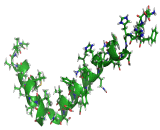Amyloid Beta Peptide 1-42 (Ab1-42)

One of the hallmarks of Alzheimer's disease is the self-aggregation of the amyloid β peptide (Aβ) in extracellular amyloid fibrils. Aβ is a peptide composed of 40 to 42 (43) amino acids, and is said to be cleaved out of the precursor protein APP by the action of β- or γ-secretase.In addition, the presence of numerous variant A β molecules has been demonstrated in the culture fluid of mouse neuroblastoma cells transfected with cDNA coding human amyloid precursor protein (APP). Among the different forms of Aβ, the 42-residue fragment (Aβ1-42) readily self-associates and forms nucleation centers from where fibrils can quickly grow. The strong tendency of Aβ1-42 to aggregate is one of the reasons for the scarcity of data on its fibril formation process. Aβ1-40 is the most common form secreted from cultured cells and found in cerebro-spinal fluid (CSF). Aβ1-42 is the major component of senile plaques and considered as the most crucial factor in AD pathogenesis.
